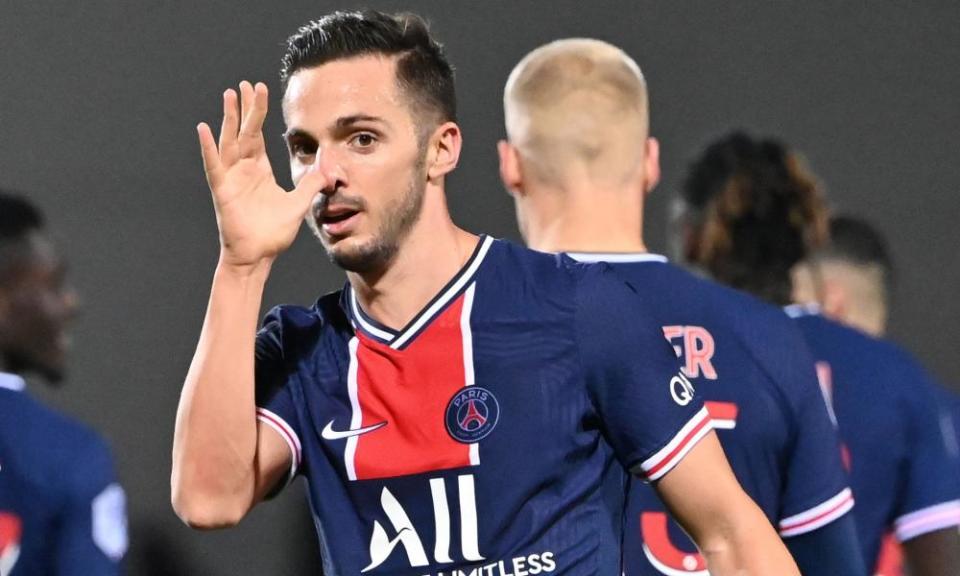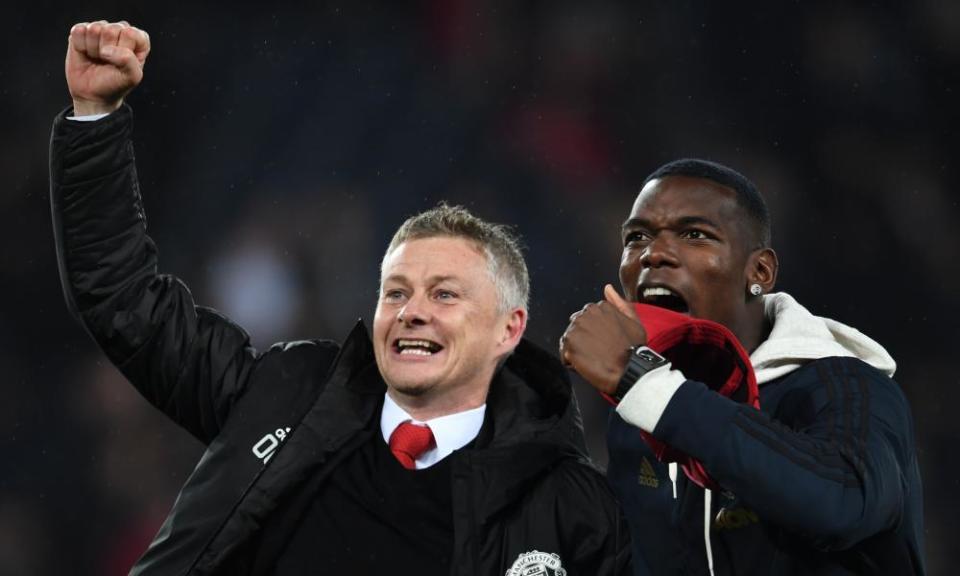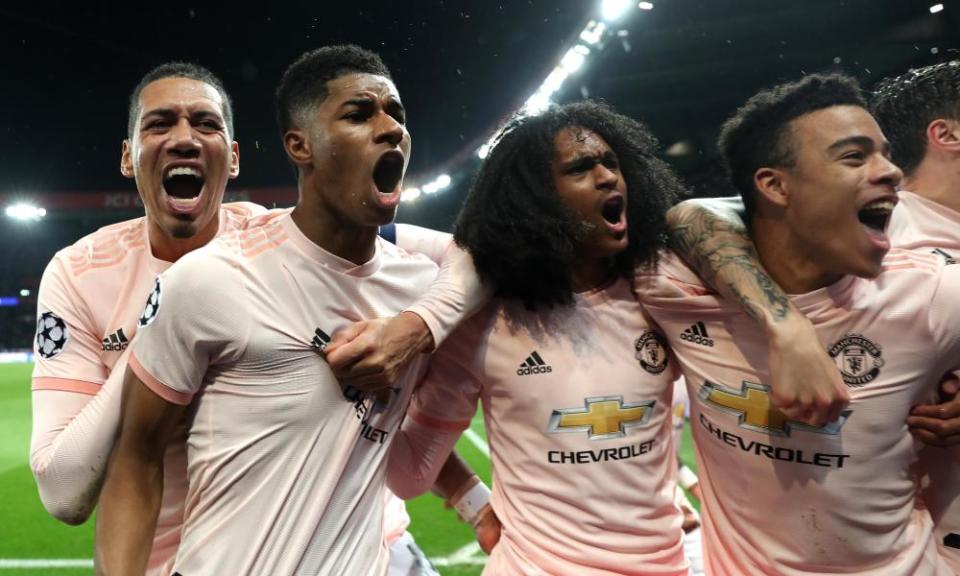PSG v Manchester United seems a portent of a dystopian super league future

The clock was already showing 90. Diogo Dalot advanced on to the ball in space around 40 yards from the Paris Saint-Germain goal. His first touch was heavy and as three opponents closed in, he had little option but to shoot. Marco Verratti threw himself towards the full-back. Juan Bernat ducked away. And the middle of the three, Presnel Kimpembe, flinching, turned his back, his arm flicking away from his body. VAR showed Dalot’s wild effort had deflected off it. From nowhere, Manchester United had a penalty and an away-goals passage into the Champions League quarter-final.
Related: Thomas Tuchel takes aim at PSG over lack of spending in transfer window
Football, increasingly, is a game built on the analysis of complex data. Everything is counted, the data studied. We talk of philosophy and psychology, of tactical evolution and leadership strategies, and yet games and seasons and careers can rise and fall on moments of absurd chance. If Dalot’s first touch had been better, would he have shot? If Ligue 1 made Bernat and Kimpembe defend more frequently, might they have shown more conviction? Had Dalot’s shot been struck more cleanly, might it have hit Kimpembe’s ribs or back rather than his arm? A season earlier, there would not have been VAR to overturn the referee’s initial decision to point for a corner. And thus history is made.

Eighteen months on, as the sides prepare to meet again in the Champions League on Tuesday, the ramifications continue to be felt. From that night grew the image of Ole Gunnar Solskjær as a magus able to conjure at will the spirit of ’99. As susceptible to public pressure as ever, Ed Woodward confirmed him in the job the following week. the former United striker had seemingly read the mood of the game, dropping deep as PSG got the upper hand early in the second half, preparing for a late assault on opponents with a habit of freezing at key moments. But emotional intelligence is not enough to be a manager of a super-club.
Last season Solskjær had some success sitting his side deep and breaking. United were relatively defensively sound and they had pace and quality in forward areas but what they did not have was the sort of coordinated attacking that is necessary now at the highest level. This season the defending has also disintegrated, which may, in fairness to the manager, at least in part be the result of Harry Maguire’s struggles.
Solskjær still has his supporters and they are right that there are much bigger problems at the club. The hastiness of his appointment, the apparent lack of broader planning, is symptomatic of the failure of leadership since Sir Alex Ferguson and the chief executive, David Gill, departed in 2013.
Related: Project Big Picture power grab is shot down but plan's ugliest parts will be back | David Conn
Understandably, fans are frustrated by how much the Glazers have taken out of the club, but of just as much practical significance, at least in the short term, is how badly the available money has been spent. Discerning a consistent strategy is impossible: from Alexis Sánchez to a focus on young British talent to Edinson Cavani in two years. A net spend of £500m on transfers over five years should guarantee a certain level, yet United’s squad are short of a left-back, a centre-back and a right-sided forward.
With waste like that it is little wonder Joel Glazer had to come up with a wheeze like Project Big Picture to cement United’s place at the top of English game. Far easier to rig the financial structures even further in your favour than actually to run a club properly.

The Champions League is a glimpse of that future. Its group stage should begin with a great sense of expectation and possibility. Look back to its richness and drama in the 90s, before the great stratification, when at least half the fixtures felt like monumental clashes, and compare that with a present that increasingly feels an accounting exercise: tot up the revenues and, in the majority of groups, watch the richest pair progress. And if, as seems likely, the format is rejigged in 2024, it will only be to make the rich richer.
Because United are fallible and because the group also contains RB Leipzig – who may have breached the spirit of German regulations on club ownership but are undeniably well-run, football’s degenerate economics somehow rendering a global brand a plucky outsider – Tuesday’s game against PSG feels significant. But a slightly different draw and this would be an effective exhibition between sides who know they will progress. Or project into a super league future and this could easily be a weary wrangle of sides too flawed to win but too rich to fail.
PSG should stand as a warning to the Premier League’s elite. In Ligue 1 they are untouchable, winning seven of the past eight French titles and the domestic treble in four of the past six years, a joyless hegemony that was at least in part responsible for the abolition of the Coupe de la Ligue at the end of last season, just as Big Picture proposed the axing of the League Cup.
But like so many of the other serial domestic champions, PSG are not happy. European success continues to elude them. Last season, they came closer than ever before thanks to a gentle draw and a late flurry against Atalanta but the tensions between celebrity players and the attempts of Thomas Tuchel to impose a structure remain damagingly close to the surface. And all the while the paradoxical truth grows more urgent: PSG’s domination of Ligue 1 – the latest Deloitte report shows revenues almost three times greater than that of the next French side, Lyon – means it is no preparation for elite football.
Related: Juve’s punt on Sarri and Ronaldo typifies superclubs’ vast carelessness | Jonathan Wilson
Or perhaps that is what Glazer wants. Perhaps this is the dream, two-thirds of the Premier League reduced to vassal status, minnows to be cuffed aside by the elite as a matter of course, no matter how badly they are managed.
PSG against United may be the pick of the week’s Champions League group games but it feels also like a harbinger of some dystopian future, of hollow games between franchises insulated from the costs of mismanagement, denuded of jeopardy and the emotional connection that makes football matter.

 Yahoo Sport
Yahoo Sport 





































